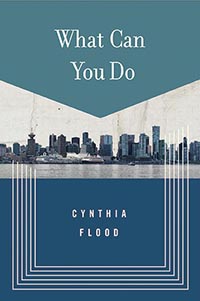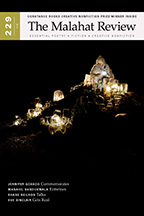Reviews
Fiction Review by Kate Kennedy
Cynthia Flood, What Can You Do (Windsor: Biblioasis, 2017). Paperbound, 150 pp., $18.95.
 What Can You Do is Vancouver writer Cynthia Flood’s fifth collection of short stories and my first introduction to her work. These twelve stories, several of them set in Vancouver, share a close-cropped narrative style, sharp sense of humour, and delight in the ambiguity between past and present, intentions admirable and less so.
What Can You Do is Vancouver writer Cynthia Flood’s fifth collection of short stories and my first introduction to her work. These twelve stories, several of them set in Vancouver, share a close-cropped narrative style, sharp sense of humour, and delight in the ambiguity between past and present, intentions admirable and less so.
Where so much depends on the parsing of this ambiguity, the collection rewards careful reading. In “Going Out,” for example, a woman goes to a fundraiser, one of her first social excursions following a breakup, knowing her ex will likely be there. What follows borders on fantastical in the quick switches from real to imagined outcomes over the course of the evening. Things said and not said occupy shared space, a grey area made even more nuanced by the story’s central exchange between the protagonist and the deaf man sitting next to her as he explains to her the plot of the mystery novel he’s been reading:
The woman, smiling under pink lamplight, fingers her glittering gift, a necklace. Steaks arrive. The two eat. Their dessert’s meringue-y. Fisher [the detective] grimaces.Aha! You recognize a Manly Sleuth who dislikes sugar, cats, fiction. Doubtless he knows all about some war. You roll your eyes. No one rolls back.
“Struggle” is told from the point of view of a veteran women’s rights activist who, it soon becomes clear, is struggling with mental illness. As she participates in organizing a Mother’s Day march for abortion rights, she attempts to keep straight what she has said only to herself and what she’s spoken aloud. Meanwhile, as readers, we attempt to sort out whether what preoccupies her is a current concern or one from the distant past. She knows what’s being said about her and at the same time has much to teach:
At the campaign office with the women, seven hours today. Tired, even with the helmet. The angry men want it off. I must fight all the time.
Many in this collective are new to all political struggle, let alone to work for abortion-law repeal. They’ve never built a demo before, can’t see the dangers. I must teach as much as work. Whoever speaks at Mother’s Day will need careful coaching.
Perhaps my favourite story in the collection is “Open, Close,” an exquisitely paced portrait of a father-daughter relationship following the mother’s death. It initially put me in mind of Alice Munro’s work with its quiet intensity, until a fascinating twist made it more akin to Kate Atkinson or Paul Auster’s recent novel-length experimental forays into alternate lifetimes, but here winnowed, almost miraculously it seemed, to just fifteen pages.
My quibbles with the collection are few. I will say that occasionally the author’s clipped, tucked style, with its pointed annotations, borders on glib. In “Wing Nut” what is at first a surprising, funny demonstration of a collective response to events at the local school (“Mothers followed sons”, “Inadequate sleep followed”, “the guardian mothers accommodated”), later begins to feel ever so slightly gimmicky. Similarly, in “Dog & Sheep,” a story that centres on a group walking tour in France, initially apt snapshots of a group mindset, including observations on landscape, local culture, their daily provisions, diminish in effectiveness by the end of the story because of their sameness.
In “Food,” on the other hand (another of my favourites), we see Flood’s shorthand in its absolute element. Two sisters in their fifties on their regular lunch date at a local restaurant observe, with delight and horror, the noisy family sitting at a nearby table.
"A flush started at Ellie’s nape. Firmly she said, 'Eat up, Charlotte!' Child and Great-aunt grinned, waving through the window. Grandfather glanced at Ellie’s plate, still heaped. 'You don’t eat either?' Great-aunt blew a smoke-ring towards Charlotte and moved off to a corner newsstand to examine headlines. The child, abandoned, gazed with dislike at her bowl. Her face puckered. She squirmed, made the high chair rock.
'Stay still,' ordered Dad. Two pieces of our bread remained. I still had most of my butter, my sister very little. Her eyes pleaded. I wouldn’t. Why should I? She could have done as I did, saved her butter, got through school to a decent job."
The scene demonstrates beautifully Flood’s knack for streamlined synopses of past and present—tucking whole decades of sibling dynamics into an aside on butter. And in a sense the story hinges, thematically, on this: the entertainment value of one family’s disagreements and delights set against the submerged drama of another. Here the very contained nature of the observations is wholly suited to the observer narrating them.
At its finest, Flood’s precision and the sly parallels she draws made me gasp. I will be tracking down her previous collections and looking out for the next.
—Kate Kennedy









